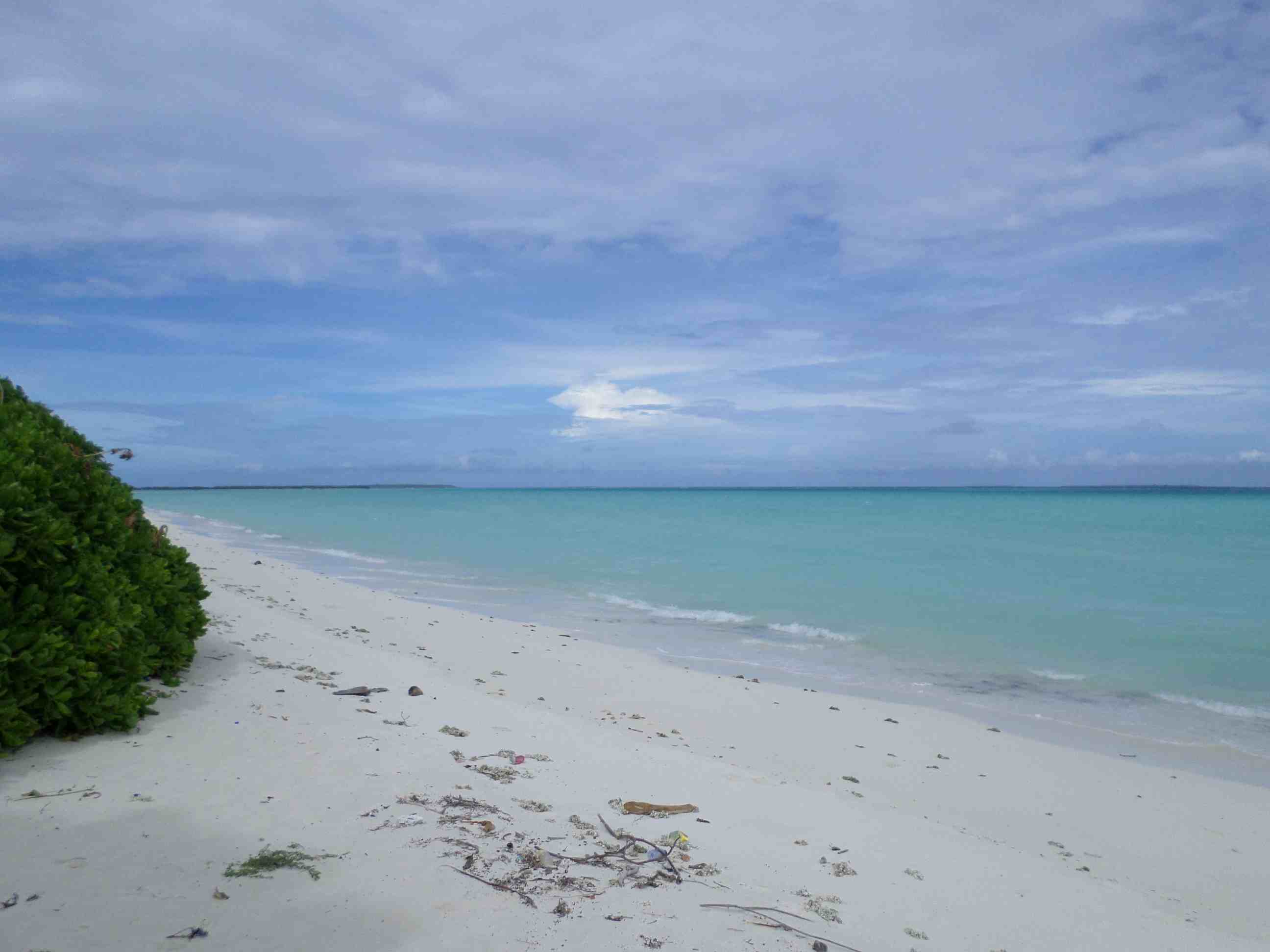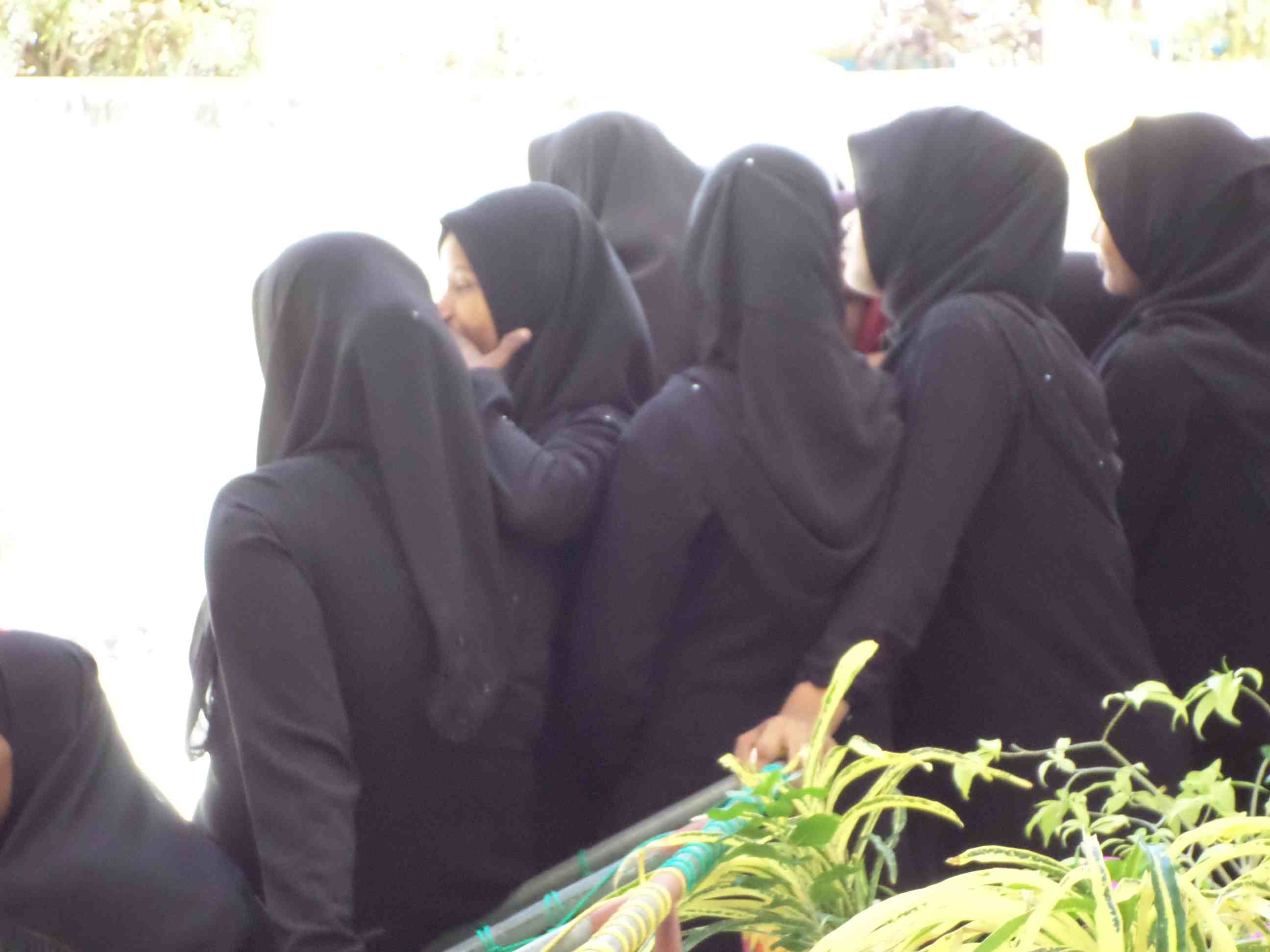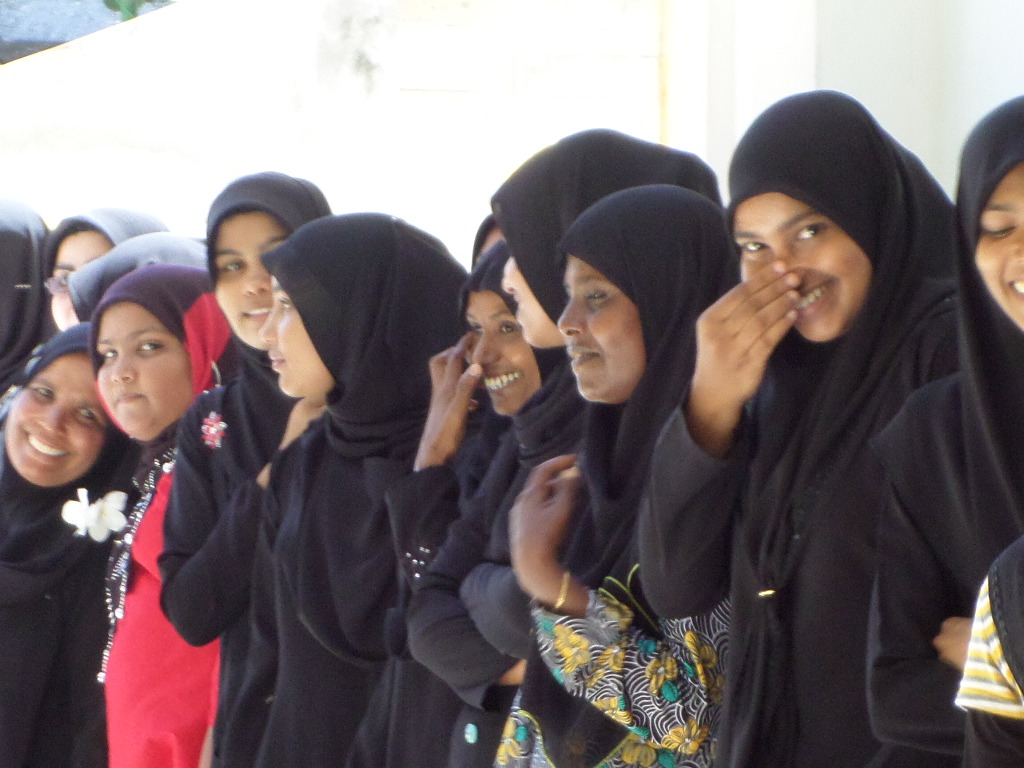Inside Nasheed’s campaign
Hanimaadhoo
We arrive at Hanimaadho International Airport around 8:30 a.m. The Maldives is experiencing seasonal rains, made especially heavy by a typhoon in the Bay of Bengal. Still, this Saturday morning, the 18 of May, the rain keeps away. The sun is watery, saturating the islands with a softer light than normal. After a night of rain, the lush green vegetation all around looks and smells freshly washed. The sea, just behind the airport’s little coffee shop, is a calm, quiet blue.
After breakfast under a Nika tree with branches that spread wide, we are driven to, Faalsaage, a guesthouse run by Dhonthu (Ibrahim Abu Bakuru) and his wife Ameena, a Male’ couple in their sixties.
Ameena and Dhonthu are typical of a group of core MDP members and activists willing to spend all their available time and energy on securing a win for the party. Dhonthu and Ameena travelled to Hanimaadho the day before Nasheed so they could prepare the guesthouse for the campaign team. MDP bears the cost of renting the rooms and feeding its team, but the rest of what is involved in ensuring the team has a place to call a base during their time in Hanimaadhoo is all effort Ameena and Dhonthu expends willingly, without charge, for the party’s success.
The presence of such people across various atolls of the country, and the successful and strategic exploitation of that rich resource, has emerged as one of the MDP campaign’s core strengths.
At Ameena and Dhonthu’s place there are about a dozen or so men busy festooning the house and its neighbour opposite with yellow MDP flags.
A woman wearing a hijab with only her eyes uncovered is standing under a palm-umbrella weaving a frangipani garland to present Nasheed with. Some men are trying to set up a temporary shelter of sea-blue canvas to provide shade during lunch.
Nasheed is due to arrive in about two hours, and there’s a feast being prepared here and in several kitchens across the island. Ameena is in charge of gathering it all in one place and serving it up. About twenty or so women have volunteered to cook—the plan is to prepare the dishes at home in their own time, and bring them over to Ameena’s for lunch.
As far as the official business of the campaign goes, Shifa Mohamed, Minister of Education in Nasheed’s cabinet, is in charge. The MDP campaign has divided the atolls into seven regions, with one designated head in charge of co-ordinating all efforts in a deignated region. Shifa is the head of the Northern Provices, and area containing the atolls of Haa Alif, Haa Dhaal and Shaviyani.
It is very easy to take to Shifa. She works without pretensions or fuss, and has an easy way with people. Having spent several weeks visiting houses in the area and co-ordinating Door to Door, ‘Shifa Madam’ is familiar to the people. On several occasions, women open up to her, voluntarily speaking of family woes and social troubles without reservation. Shifa is a good listener.
In the garden of Faalsaage, a wheelbarrow full of coconuts appears. One of the men shaves and cut the tips off the young kurumba to serve as a welcome drink when Nasheed and his team arrive. A woman sits at the corner of a table in the garden, frangipani garland in hand. She will be the one putting it around Nasheed’s neck when he comes.
To her right is another smaller table on which now stands a cake. ‘Happy Birthday, our hero,’ says the green and yellow cake. Two women stand near, swatting away flies with the intention of landing on their creation. One of the women is the same one in a hijab I noticed earlier.
“It was Nasheed’s birthday yesterday,” she tells me. There is excitement in her eyes, the only part of her I can see. “He is our hero,” she repeats what they have already said in confectionary. With only eyes as a guide, I guess her to be anywhere between fifty and sixty years of age. A group of women collected Rf20 each, bought the ingredients, baked and decorated the cake, she tells me.
By noon, the steady trickle of women turn into a stream. Having cooked and delivered the food, all the women have returned in their best dresses to greet Nasheed. Almost all are wearing black from head to toe.
It is an astounding change from about a decade ago, when any gathering of Maldivian women would have brought together every colour of fabric under the sun. Today, the only relief from the monotone of black are bolts of canary yellow—women accessorising with yellow burugaas or children dressed in yellow.
When Nasheed arrives there’s close to a hundred women at the guesthouse. There are also about half that amount of men.
Nasheed shakes hands with them all, chats to people over his drink of fresh coconut, cuts the cake to the obvious delight of the women, and disappears upstairs with Shifa, a group of councillors and Hanimaadhoo’s resident campaign team. They will discuss the area’s Door to Door strategies.
Lunch is the feast that it promised to be. There is garudhiya, kulhimas, roshi, all sorts of mas-huni, faiy riha…a whole range of Maldivian dishes that taste as delightful as only island-home-cooked Maldivian dishes can taste.
As Nasheed rests, prays and strategises, I spend the time chatting to some women who still linger. They are waiting to say goodbye when Nasheed leaves for Kulhudhuffushi in a short while.
It is easy to chat with the women. Despite their attire, and the appearance of conservative religiosity, the women were as mischievous and their banter as full of flirtatious double-meanings as women in the region were famed for before Islamists began exercising control over the conduct of their daily lives and faith.
I learn from the women that this part of the island, closer to the airport, is where the people of Hon’daidhoo settled when they were relocated after the 2004 Tsunami wrecked their island. ‘The indigenous people of Hanimaadhoo live over on the other side,’ one of the women tell me.
Most of them, says Mariyam Nazima (35), are also on ‘the other side’ politically—that being supporters of PPM and Gayoom loyalists.
The women are eager to gossip. They tell me Waheed and Ilham have a holiday home on Hanimaadhoo and visited recently. ‘Waheed made it seem like he’s from the island,’ Nazima laughs. ‘But we knew they got land during an earlier decentralisation plan.”
I ask why they like Nasheed. “He’s like one of us. He treats us like equals,” she says. Other women on the jolis beside us agree. “He visits all the houses, rich and poor alike.”
On all islands that I visit with the MDP campaign team, this is what supporters point to as the reason they like Nasheed most: he is one of us.


